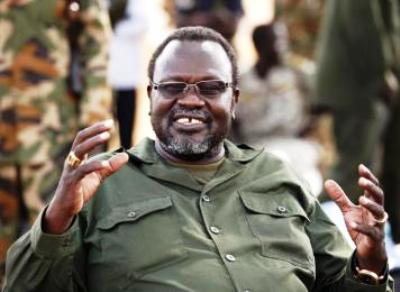S. Sudan rebels back interim government without Salva Kiir
March 2, 2014 (ADDIS ABABA/KHARTOUM) – South Sudanese rebels fighting the government in Juba since mid-December said they accepted “in principle” the proposal of forming an interim government in South Sudan pending elections, but added “this should be minus Salva Kiir.”

“We have agreed in principle to the proposal on formation of an interim government in South Sudan pending elections. But this should be minus Salva Kiir because of his experienced dictatorial and violent-oriented leadership style which has now resulted to chaos and bloodbath in our new country,” said Machar’s spokesperson, James Gatdet Dak.
“With Salva Kiir leading the proposed interim government, this will mean continuation of dictatorship, tribalism, corruption and return to violence, which nobody should accept,” Dak further stressed.
He said the “best gift” Kiir should offer to the nation is to “step down” and allow democracy, good governance and development to bud and take root in the country under a democratic visionary leader.
When asked whether Machar would equally step aside and give way for a neutral personality to lead the interim government, Dak said the matter needed further study, further stressing that his boss has been a “bold voice of the voiceless” on issues of democracy and good governance.
“Well, Dr. Machar has been very vocal over the years about the need to build a democratic state in South Sudan. I believe the people of South Sudan want him to lead such an interim government in order to ensure free and fair democratic processes toward elections,” Dak said, adding that they would not accept a “masquerader” to seize the opportunity only to turn into another “dictator”.
However, President Kiir’s spokesperson Ateny Wek Ateny, rejected rebels demands, saying they will not accept an interim government without the South Sudan leader.
“There is no way Salva Kiir steps down, save that he fails to win the coming presidential elections,” Ateny told reporters while in Khartoum on Saturday.
He however added that Juba government would welcome the rebels to participate in the coming presidential elections.
While revealing the economic bite on the government, Ateny further said Juba has so far lost 29% of its oil revenues as the result of the rebels’ advances in the oil producing state of Upper Nile.
“South Sudan is producing 175,000 barrels per day, down from 245,000 barrels a day before the fighting broke out,” he revealed.
The two sides are yet to agree on the details of the formation of the interim government as they adjourned the talks in Addis Ababa for consultations with their superiors while fighting continues on the ground.
Fighting started in Juba on 15 December and spread to three other states after President Kiir, a Dinka, allegedly attempted to disarm Machar’s Nuer soldiers in the presidential guards unit in the capital.
Kiir has, however, accused his political rival, Machar of allegedly attempting a coup, which the latter denied, saying the former instead used the violence as a pretext to destroy his political opponents within the SPLM ahead of elections slated for 2015.
Over 10,000 people have died and nearly a million displaced, according to the United Nations estimates since the violence started in mid-December.
(ST)
